小学英语语法时态讲解与归纳.
- 格式:doc
- 大小:53.50 KB
- 文档页数:7
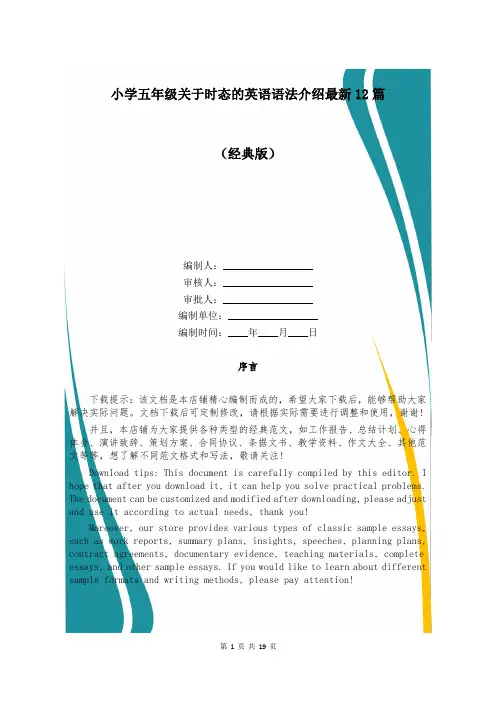
小学五年级关于时态的英语语法介绍最新12篇(经典版)编制人:__________________审核人:__________________审批人:__________________编制单位:__________________编制时间:____年____月____日序言下载提示:该文档是本店铺精心编制而成的,希望大家下载后,能够帮助大家解决实际问题。
文档下载后可定制修改,请根据实际需要进行调整和使用,谢谢!并且,本店铺为大家提供各种类型的经典范文,如工作报告、总结计划、心得体会、演讲致辞、策划方案、合同协议、条据文书、教学资料、作文大全、其他范文等等,想了解不同范文格式和写法,敬请关注!Download tips: This document is carefully compiled by this editor. I hope that after you download it, it can help you solve practical problems. The document can be customized and modified after downloading, please adjust and use it according to actual needs, thank you!Moreover, our store provides various types of classic sample essays, such as work reports, summary plans, insights, speeches, planning plans, contract agreements, documentary evidence, teaching materials, complete essays, and other sample essays. If you would like to learn about different sample formats and writing methods, please pay attention!小学五年级关于时态的英语语法介绍最新12篇英语时态是语法的一个难点,也是我们学习的重点。
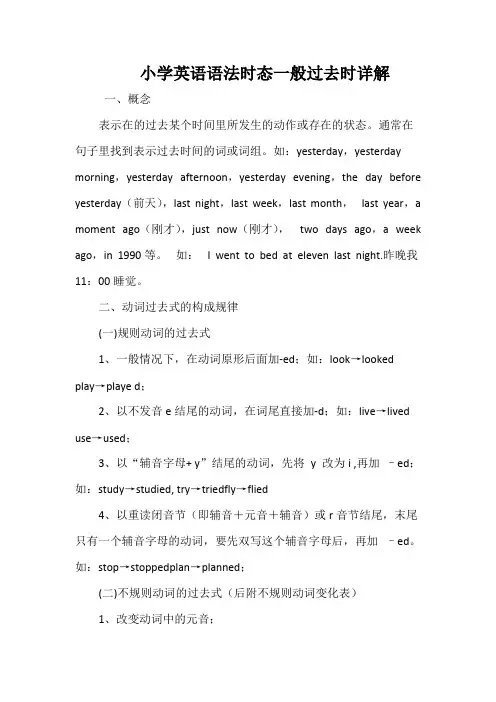
小学英语语法时态一般过去时详解一、概念表示在的过去某个时间里所发生的动作或存在的状态。
通常在句子里找到表示过去时间的词或词组。
如:yesterday,yesterday morning,yesterday afternoon,yesterday evening,the day before yesterday(前天),last night,last week,last month,last year,a moment ago(刚才),just now(刚才),two days ago,a week ago,in 1990等。
如:I went to bed at eleven last night.昨晚我11:00睡觉。
二、动词过去式的构成规律(一)规则动词的过去式1、一般情况下,在动词原形后面加-ed;如:look→looked play→playe d;2、以不发音e结尾的动词,在词尾直接加-d;如:live→lived use→used;3、以“辅音字母+ y”结尾的动词,先将y 改为i ,再加–ed;如:study→studied, try→triedfly→flied4、以重读闭音节(即辅音+元音+辅音)或r音节结尾,末尾只有一个辅音字母的动词,要先双写这个辅音字母后,再加–ed。
如:stop→stoppedplan→planned;(二)不规则动词的过去式(后附不规则动词变化表)1、改变动词中的元音;begin→began drink→drank come→came eat→ate grow→grew run→ran know→knew win→wonspeak→spoketake→took write→wrote get→got2、变词尾的–d 为–t ;build→built lend→lent send→sent spend→spent bend→bent3、与动词原形一样;cut→cut put→put cost→cost hurt→hurt shut→shut4、变-ay 为-aid (少数动词);say→said pay→paid lay→laid5、采用不同词根;sell→sold teach→taught buy→bought6、其他。
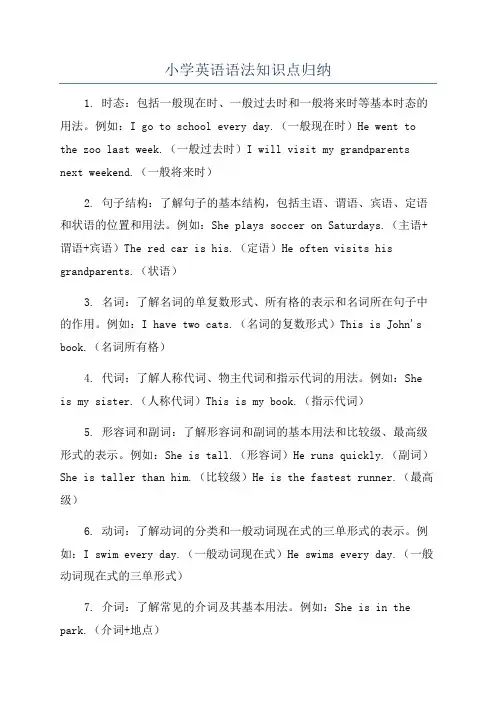
小学英语语法知识点归纳1. 时态:包括一般现在时、一般过去时和一般将来时等基本时态的用法。
例如:I go to school every day.(一般现在时)He went to the zoo last week.(一般过去时)I will visit my grandparents next weekend.(一般将来时)2. 句子结构:了解句子的基本结构,包括主语、谓语、宾语、定语和状语的位置和用法。
例如:She plays soccer on Saturdays.(主语+谓语+宾语)The red car is his.(定语)He often visits his grandparents.(状语)3. 名词:了解名词的单复数形式、所有格的表示和名词所在句子中的作用。
例如:I have two cats.(名词的复数形式)This is John's book.(名词所有格)4. 代词:了解人称代词、物主代词和指示代词的用法。
例如:She is my sister.(人称代词)This is my book.(指示代词)5. 形容词和副词:了解形容词和副词的基本用法和比较级、最高级形式的表示。
例如:She is tall.(形容词)He runs quickly.(副词)She is taller than him.(比较级)He is the fastest runner.(最高级)6. 动词:了解动词的分类和一般动词现在式的三单形式的表示。
例如:I swim every day.(一般动词现在式)He swims every day.(一般动词现在式的三单形式)7. 介词:了解常见的介词及其基本用法。
例如:She is in the park.(介词+地点)8. 冠词:了解冠词的基本用法和区别。
例如:I have a pen.(不定冠词)This is the book.(定冠词)9. 疑问句:了解疑问句的基本结构和特殊疑问词的用法。
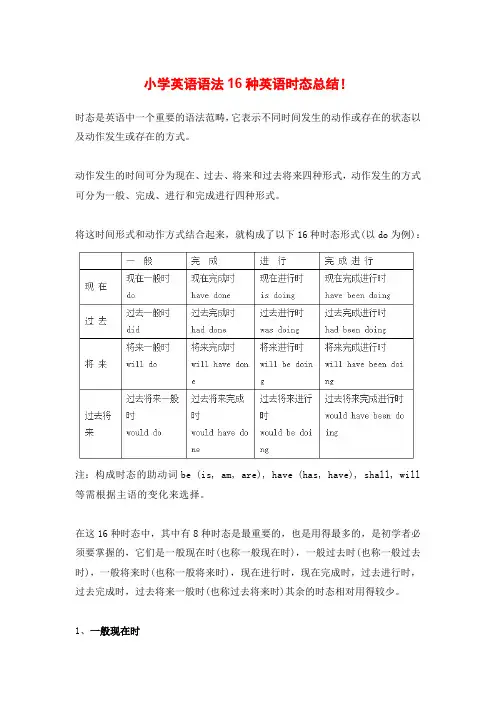
小学英语语法16种英语时态总结!时态是英语中一个重要的语法范畴,它表示不同时间发生的动作或存在的状态以及动作发生或存在的方式。
动作发生的时间可分为现在、过去、将来和过去将来四种形式,动作发生的方式可分为一般、完成、进行和完成进行四种形式。
将这时间形式和动作方式结合起来,就构成了以下16种时态形式(以do为例):注:构成时态的助动词be (is, am, are), have (has, have), shall, will 等需根据主语的变化来选择。
在这16种时态中,其中有8种时态是最重要的,也是用得最多的,是初学者必须要掌握的,它们是一般现在时(也称一般现在时),一般过去时(也称一般过去时),一般将来时(也称一般将来时),现在进行时,现在完成时,过去进行时,过去完成时,过去将来一般时(也称过去将来时)其余的时态相对用得较少。
1、一般现在时用法:A) 表示现在发生的动作、情况、状态和特征。
B) 习惯用语。
C) 经常性、习惯性动作。
例:He always helps others. (他总是帮助别人。
)D) 客观事实和普遍真理。
尤其要注意,如果前后文不是一般现在时,则无法保持主句、从句时态一致。
E) 表示一个按规定、计划或安排要发生的动作,(仅限于某些表示“来、去、动、停、开始、结束、继续”等的动词)可以与表示未来时间的状语搭配使用。
常见的用法是:飞机、火车、轮船、汽车等定期定点运行的交通方式。
例:The next train leaves at 3 o clock this afternoon.(下一趟火车今天下午3点开车。
)How often does this shuttle bus run? (这班车多久一趟?)F) 在时间和条件状语从句里经常用一般现在(有时也用现在完成时)表示将来事情。
例:When you have finished the report, I will have waited for about 3 hours.(等你完成这份报告的时候,我就已经等了将近3个小时了。
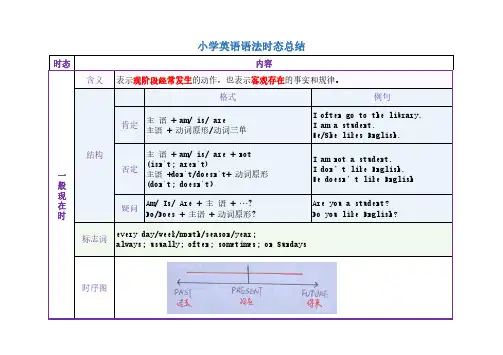
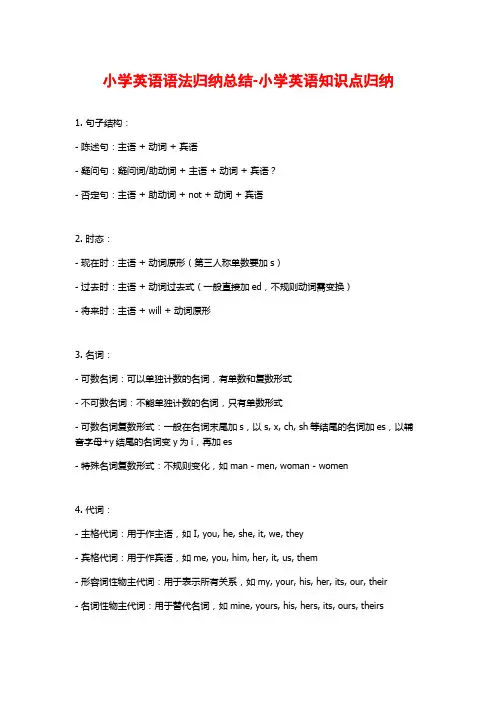
小学英语语法归纳总结-小学英语知识点归纳1. 句子结构:- 陈述句:主语 + 动词 + 宾语- 疑问句:疑问词/助动词 + 主语 + 动词 + 宾语?- 否定句:主语 + 助动词 + not + 动词 + 宾语2. 时态:- 现在时:主语 + 动词原形(第三人称单数要加s)- 过去时:主语 + 动词过去式(一般直接加ed,不规则动词需变换)- 将来时:主语 + will + 动词原形3. 名词:- 可数名词:可以单独计数的名词,有单数和复数形式- 不可数名词:不能单独计数的名词,只有单数形式- 可数名词复数形式:一般在名词末尾加s,以s, x, ch, sh等结尾的名词加es,以辅音字母+y结尾的名词变y为i,再加es- 特殊名词复数形式:不规则变化,如man - men, woman - women4. 代词:- 主格代词:用于作主语,如I, you, he, she, it, we, they- 宾格代词:用于作宾语,如me, you, him, her, it, us, them- 形容词性物主代词:用于表示所有关系,如my, your, his, her, its, our, their- 名词性物主代词:用于替代名词,如mine, yours, his, hers, its, ours, theirs5. 动词:- 基本动词:表示基本动作或状态的词汇,如play, run, eat- 助动词:用来辅助构成时态、人称、语态等形式,如be, do, have- 行为动词与非行为动词:行为动词表示具体的行动,如swim, dance,非行为动词表示状态或感觉,如like, love6. 形容词和副词:- 形容词:描述名词的词,用于修饰名词,一般放在名词前面,如big, small- 副词:描述动词、形容词或其他副词的词,用于修饰动词、形容词或其他副词,一般放在动词或形容词前面,如quickly, well7. 介词:- 介词的作用是连接名词或代词与其他词语,表示一种关系,如in, on, under8. 连词:- 并列连词:用于连接并列的词、短语或句子,如and, but, or- 从属连词:用于引导从句,如because, if, when以上是小学英语语法的基本知识点的归纳总结。
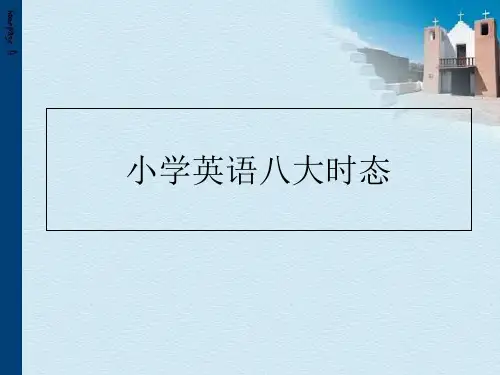

(一)一般现在时定义:经常、反复发生的动作或行为及现在的某种状况。
时间状语:often, usually, always, sometimes, everyday(week,month),once a week,on Mondays, etc.结构:1.be动词2.行为动词主语+be+其他一般疑问句:1.把动词be放于句首。
2.用助动词do提问,如主语为第三人称单数,则用does,同时还原为动词原形。
否定句形式:1.am/is/are+not2.此时态的谓语动词若为行为动词,则在其前加d on’t;若主语为第三人称单数,则用doesn’t,同时还原行为动词。
(二)现在进行时定义:表示现阶段或说话时正在进行的动作或状态。
时间状语:now, at this time, these days, etc.结构:主语+am/ is/ are +doing一般疑问句:把be动词放在句首。
否定句形式:主语+am/ is/ are +not +doing(三)一般过去时定义:过去某个时间里发生的动作或状态;过去习惯性、经常性的动作、行为。
时间状语:ago, yesterday, last week(month, year…), in 2000, just now, one day,long long ago, etc.结构:1.was/were2.行为动词过去式一般疑问句:1.把was或 were放于句首。
2.用助动词did提问,同时还原为动词原形。
否定句形式:1.主语+was/were+ not2.在行为动词前加do在其前加didn’t,同时还原行为动词。
(四)过去进行时定义:表示过去某段时间或某一时刻正在发生或进行的动作或行为。
时间状语:at this time yesterday或以when引导的谓语动词是一般过去时的时间状语等。
结构:主语+was/were+ doing一般疑问句:把was或were放在句首。
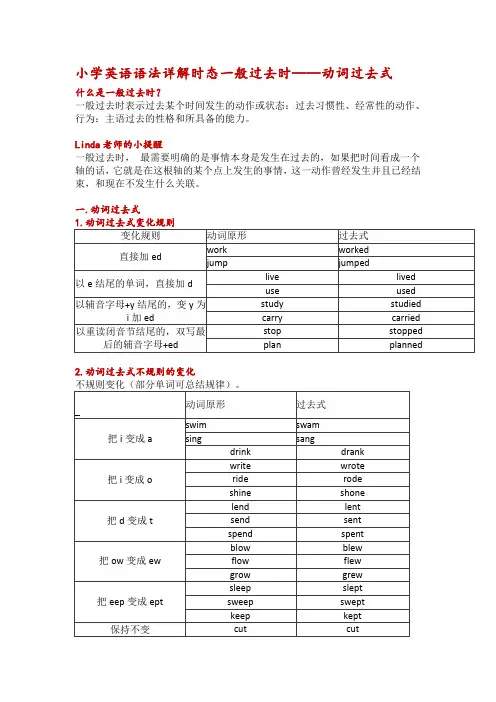
小学英语语法详解时态一般过去时——动词过去式什么是一般过去时?一般过去时表示过去某个时间发生的动作或状态:过去习惯性、经常性的动作、行为:主语过去的性格和所具备的能力。
Linda老师的小提醒一般过去时,最需要明确的是事情本身是发生在过去的,如果把时间看成一个轴的话,它就是在这根轴的某个点上发生的事情,这一动作曾经发生并且已经结束,和现在不发生什么关联。
一.动词过去式2.动词过去式不规则的变化Linda老师的小提醒★大部分过去式还是需要去记忆的:be动词的过去式一was(am,is的过去式). were(are的过去式)。
一些实义动词的过去式,dig→ dug,run→ ran,eat→ ate,fall→ fell,lie→ lay等。
★部分动词的过去式两种都是可以的,比如:lean→ leaned/leant;dream→ dreamt/dreamed;bet→ bet/betted等。
小学英语语法详解时态一般过去时——一般过去时的句式变化二.一般过去时的句式变化1.陈述句:主语+动词过去式+其他I saw the rianbow yesterday.我昨天看到了彩虹。
They went to he park last Sunday.上周日他们去了公园。
Ben got up at six this morning.本今天早上是六点起床的。
2.一般疑问句1)将be动词提到句首陈述句:It was an egg yesterday.它昨天还是一个蛋。
一般疑问句:Was it an egg yesterday?它昨天还是一个蛋吗?陈述句:They were at school just now.他们刚才还在学校。
一般疑问句:Were they at school just now?他们刚才还在学校吗?Linda老师的小提醒主语是第一人称和第二人称的句子,其过去时变化时,要注意be动词的变化。
一般疑问句:Were you at home last night?你昨天晚上在家吗?肯定回答:Yes,I was.否定回答:No,I wasn't.2)用助动词did陈述句:I did my homework at school,我在学校做了作业。
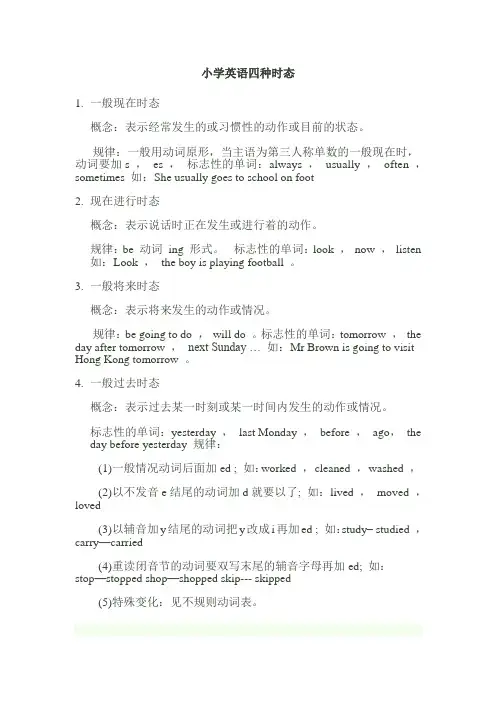
小学英语四种时态1.一般现在时态概念:表示经常发生的或习惯性的动作或目前的状态。
规律:一般用动词原形,当主语为第三人称单数的一般现在时,动词要加s ,es ,标志性的单词:always ,usually ,often ,sometimes 如:She usually goes to school on foot2.现在进行时态概念:表示说话时正在发生或进行着的动作。
规律:be 动词ing 形式。
标志性的单词:look ,now ,listen 如:Look ,the boy is playing football 。
3.一般将来时态概念:表示将来发生的动作或情况。
规律:be going to do ,will do 。
标志性的单词:tomorrow ,the day after tomorrow ,next Sunday … 如:Mr Brown is going to visit Hong Kong tomorrow 。
4.一般过去时态概念:表示过去某一时刻或某一时间内发生的动作或情况。
标志性的单词:yesterday ,last Monday ,before ,ago,the day before yesterday 规律:(1)一般情况动词后面加ed ; 如:worked ,cleaned ,washed ,(2)以不发音e结尾的动词加d就要以了; 如:lived ,moved ,loved(3)以辅音加y结尾的动词把y改成i再加ed ; 如:study– studied ,carry—carried(4)重读闭音节的动词要双写末尾的辅音字母再加ed; 如:stop—stopped shop—shopped skip--- skipped(5)特殊变化:见不规则动词表。
小学英语固定搭配Good night 晚安.in the morning 在早上at noon 在中午in the afternoon 在下午in the evening 在傍晚at night 在夜间have/eat breakfast 吃早饭have/eat lunch 吃午饭have/eat supper(dinner) 吃晚饭read a book 读书sing a song 唱歌have a meeting 开会have class 上课have a party 聚会have a competition 竞赛have a sleep 睡觉have a snack 吃零食have a picnic 野餐have a buffet dinner 吃自助餐draw pictures 画画listen to music 听音乐listen to the radio 听收音机learn English 学习英语learn Chinese 学习语文Learn math 学习数学tell stories 讲故事take a walk 散步ask and answer questions 问答问题fly a kite 放风筝ride a bike 骑自行车ride a horse 骑马play computer games 玩电脑游戏play games 做游戏play hide and seek 玩捉迷藏do homework 做作业watch TV 看电视take a shower 洗淋浴take a bath 洗澡open the door 开门open the window 开窗户close the door 关门close the window 关窗户paly football 踢足球/打橄榄球play basketball 打篮球play volleyball 打排球play badminton 打羽毛球play golf 打高尔夫球play bowling 打保龄球play table tennis 打乒乓球play baseball 打棒球play tennis 打网球play soccer 踢足球play hockey 打曲棍球play chess 下棋go fishing 去钓鱼go swimming 去游泳go shopping 去购物go skating 去滑冰go bike-riding/ go cycling 去骑自行车go sking 去滑雪go camping 去野营listen to the news 听新闻read the newspaper 看报read the magazine 看杂志go to school 去上学go home 回家go to the park 去公园go to the zoo 去动物园go to the library 去图书馆go to the hospital 去医院go to the cinema 去电影院go to see a film /movie去看电影get up 起床go to bed 上床go to sleep 去睡觉brush the teeth 刷牙wash the hands 洗手wash the face 洗脸wash clothes 洗衣服air the room 给房间通风make the bed 铺床sweep the floor 扫地mop the floor 拖地clean the room 打扫房间climb the trees 爬树climb the mountains 爬山cook the meals 做饭drink milk/juice/coca cola 喝牛奶/果汁/可乐play the piano 弹钢琴play the violin 拉小提琴play the drum 打鼓play the guitar 弹吉他play the xylophone 弹木琴play the flute 吹笛子play the harp 弹竖琴play the erhu 拉二胡play the zither 弹古筝play the banjo 弹班卓play the trumpet 吹小号stay at home 呆在家里at home 在家at school 在学校at church 在教堂make a cake 做蛋糕take pictures/photos 照相comb hair 梳头发have a haircut 理发go away 走开at the weekend 在周末stand up 起立sit down 坐下New year 元旦Spring Festival 春节Lantern Festival 元宵节Spring Cleaning Day 清明节Dragon Boat Festival 龙舟节International labour day 国际劳动节Trees planting day 植树节Children's day 儿童节Party's day 党的生日Army's day 建军节Teacher's day 教师节National day 国庆节Thanksgiving day 感恩节Chrismas day 圣诞节in the morning 在早上at noon 在中午in the afternoon 在下午in the evening 在傍晚at night 在夜间have/eat breakfast 吃早饭have/eat lunch 吃午饭have/eat supper(dinner) 吃晚饭read a book 读书sing a song 唱歌have a meeting 开会have class 上课have a party 聚会have a competition 竞赛have a sleep 睡觉have a snack 吃零食have a picnic 野餐have a buffet dinner 吃自助餐draw pictures 画画listen to music 听音乐listen to the radio 听收音机learn English 学习英语learn Chinese 学习语文Learn math 学习数学tell stories 讲故事take a walk 散步ask and answer questions 问答问题fly a kite 放风筝ride a bike 骑自行车ride a horse 骑马play computer games 玩电脑游戏play games 做游戏play hide and seek 玩捉迷藏do homework 做作业watch TV 看电视take a shower 洗淋浴take a bath 洗澡open the door 开门open the window 开窗户close the door 关门close the window 关窗户paly football 踢足球/打橄榄球play basketball 打篮球play volleyball 打排球play badminton 打羽毛球play golf 打高尔夫球play bowling 打保龄球play table tennis 打乒乓球play baseball 打棒球play tennis 打网球play soccer 踢足球play hockey 打曲棍球play chess 下棋go fishing 去钓鱼go swimming 去游泳go shopping 去购物go skating 去滑冰go bike-riding/ go cycling 去骑自行车go sking 去滑雪go camping 去野营listen to the news 听新闻read the newspaper 看报read the magazine 看杂志go to school 去上学go home 回家go to the park 去公园go to the zoo 去动物园go to the library 去图书馆go to the hospital 去医院go to the cinema 去电影院go to see a film /movie去看电影get up 起床go to bed 上床go to sleep 去睡觉brush the teeth 刷牙wash the hands 洗手wash the face 洗脸wash clothes 洗衣服air the room 给房间通风make the bed 铺床sweep the floor 扫地mop the floor 拖地clean the room 打扫房间climb the trees 爬树climb the mountains 爬山cook the meals 做饭drink milk/juice/coca cola 喝牛奶/果汁/可乐play the piano 弹钢琴play the violin 拉小提琴play the drum 打鼓play the guitar 弹吉他play the xylophone 弹木琴play the flute 吹笛子play the harp 弹竖琴play the erhu 拉二胡play the zither 弹古筝play the banjo 弹班卓play the trumpet 吹小号stay at home 呆在家里at home 在家at school 在学校at church 在教堂make a cake 做蛋糕take pictures/photos 照相comb hair 梳头发have a haircut 理发go away 走开at the weekend 在周末stand up 起立sit down 坐下New year 元旦Spring Festival 春节Lantern Festival 元宵节Spring Cleaning Day 清明节Dragon Boat Festival 龙舟节International labour day 国际劳动节Trees planting day 植树节Children's day 儿童节Party's day 党的生日Army's day 建军节Teacher's day 教师节National day 国庆节小学英语动词过去式agree 同意agreedask 问askedanswer 回答answeredbecome 成为becamebegin 开始beganbring 带来broughtbuy 买boughtcall 呼叫calledcarry 搬运carriedcatch 抓住caughtcheck 检查checkedclean 清洁cleanedclimb 爬climbedcome 来camecook 煮cookedcut 切cutdance 跳舞danceddo 做diddraw 画drewdrink 喝drankdrive 驾驶droveeat 吃ateenjoy 欣赏enjoyedfeel 感觉feltfly 飞fliedforget 忘记forgotfish 钓鱼fishedget 得到gotgive 给gavego 去wentgrow 成长grewhave 有hadhear 听到heardhelp 帮助helpedjump 跳jumpedkeep 保存keptknow 知道knewlearn 学习learned listen 听listenedlike 喜欢likedlook 看lookedlive 生活livedlove 喜爱lovedmake 做mademeet 遇见metmove 移动moved need 需要needed open 打开opened paint 画paintedpick 摘pickedplay 玩playedplan 计划planned practise 练习practised prefer 更喜欢preferred put 放putread 读readride 骑roderun 跑ransay 说saidsee 看sawsit 坐satskip 跳skippedspeak 说spokestart 开始startedstay 停留stayed sweep 扫sweptstudy 学习studied swim 游泳swamtalk 谈话talkedtake 带去tookteach 教taughtthank 谢谢thanked tell 告诉toldthink 想thought travel 旅游traveledtry 试trieduse 使用used wake 醒来woke walk 走路walked want 想wanted wash 洗washed watch 看watched water 浇水watered wave 挥动waved work 工作worked worry 担心worried write 写wrote小学英语可数名词复数形式1)以y结尾的专有名词,或元音字母+y 结尾的名词变复数时,直接加s变复数。
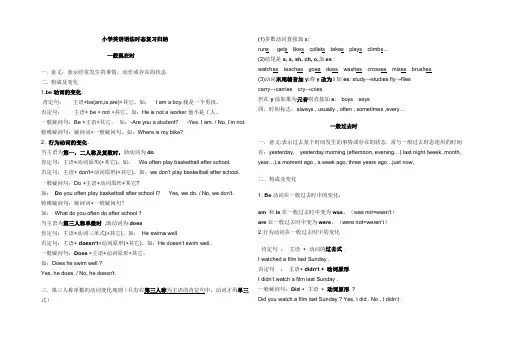
小学英语语法时态复习归纳一般现在时一. 意义:表示经常发生的事情,动作或存在的状态二. 构成及变化1.be动词的变化。
肯定句:主语+be(am,is,are)+其它。
如:I am a boy.我是一个男孩。
否定句:主语+ be + not +其它。
如:He is not a worker.他不是工人。
一般疑问句:Be +主语+其它。
如:-Are you a student? -Yes. I am. / No, I'm not. 特殊疑问句:疑问词+一般疑问句。
如:Where is my bike?2. 行为动词的变化。
当主语为第一,二人称及复数时,助动词为do肯定句:主语+动词原形(+其它)。
如:We often play basketball after school.否定句:主语+ don't+动词原形(+其它)。
如:we don’t play basketball after school.一般疑问句:Do +主语+动词原形+其它?如:Do you often play basketball after school l? Yes, we do. / No, we don't.特殊疑问句:疑问词+一般疑问句?如:What do you often do after school ?当主语为第三人称单数时,助动词为does肯定句:主语+动词三单式(+其它)。
如:He swim s well.否定句:主语+ doesn’t+动词原形(+其它)。
如:He doesn’t swim well..一般疑问句:Does +主语+动词原形+其它。
如:Does he swim well ?Yes, he does. / No, he doesn't.三.第三人称单数的动词变化规则(只有在第三人称为主语的肯定句中,动词才用单三式)(1)多数动词直接加s:runs gets likes collets takes plays climbs…(2)结尾是s, x, sh, ch, o,加es :watches teaches goes does washes crosses mixes brushes(3)动词末尾辅音加y:将y改为i加es: study→studies fly→fliescarry→carr ies cry→cries但在y前如果为元音则直接加s: buys says四.时间标志:always , usually , often , sometimes ,every…一般过去时一.意义:表示过去某个时间发生的事情或存在的状态. 常与一般过去时态连用的时间有:yesterday, yesterda y morning (afternoon, evening…) last night (week, month, year…),a moment ago , a week ago, thr ee years ago…just now,二.构成及变化1. Be动词在一般过去时中的变化:am和is在一般过去时中变为was。
英文学习归纳:英语语法16种时态总结1. 一般现在时(do/does; is/am/are)①表示现在的情况、状态和特征。
例:He is a student.他是一个学生。
②表示经常性、习惯性动作。
例:He always helps others.他总是帮助别人。
③客观事实和普遍真理。
例:The earth moves around the sun.地球绕着太阳转。
④表示一个按规定、计划或安排要发生的动作。
(常用于列车、客车、飞机或轮船时刻表)例:The next train leaves at 3 o'clock this afternoon.下一趟火车今天下午3点开车。
⑤主将从现:在时间、条件和让步状语从句中经常用一般现在表示将的来事情。
例:If it rains tomorrow, we will stay at home.如果明天下雨,我们会待在家里。
④现在进行时与频度副词连用,表示说话者或褒义或贬义的感情色彩。
例:He is always helping others.他总是帮助别人。
(褒义)④过去进行时和频度副词连用可以表示说话者或褒义或贬义的感情色彩。
例:When he lived in country,he was always helping the poor. 住在乡下时,他总是帮助穷人。
4. 一般将来时①基本结构是will do。
例:We will send her a glass hand-made craft as her birthday gift.我们将送给她一个玻璃的手工制品,作为给她的生日礼物。
②表示“打算…,要…”时,可用am/is/are going to do。
例:This is just what I am going to say.这正是我想说的。
③表示“即将、正要”时,可用am/is/are about to do。
强调近期内或马上要做的事。
六年级英语上册时态归纳
以下是六年级英语上册的时态归纳:
现在进行时:表示正在进行的动作或状态,常与now,look,listen等词连用。
结构为“be动词+动词ing”。
例如:I am doing my homework now.
一般现在时:表示经常发生的动作或存在的状态,通常与always,usually,sometimes等词连用。
结构为“主语+动词s/es (第三人称单数) / 动词原
形 (非第三人称单数)”。
例如:She goes to school by bus every day.
一般过去时:表示过去某个时间发生的动作或存在的状态,通常与ago,last,yesterday等词连用。
结构为“主语+动词过去式”。
例如:I saw a movie last night.
一般将来时:表示将来某个时间将要发生的动作或存在的状态,通常与tomorrow,next week,in a few days等词连用。
结构为“主语+will+动词原形”或“主语+be动词+动词ing”。
例如:I will go to the park tomorrow.
以上是六年级英语上册常见的四种时态,每种时态都有其特定的用法和结构,需要根据具体的语境选择合适的时态。
五年级英语下册《16种语法时态》开学建议收藏1. 一般现在时(do/does; is/am/are)①表示现在的情况、状态和特征。
例:He is a student. 他是一个学生。
② 表示经常性、习惯性动作。
例:He always helps others. 他总是帮助别人。
③客观事实和普遍真理。
例:The earth moves the sun. 地球绕着太阳转。
2. 现在进行时(am/is/are doing)① 表示此时此刻正在发生的事情。
例:He is listning to the music now.他现在正在听音乐。
② 表示目前一段时间内一直在做的事情,但不一定此时此刻正在做。
例:I am studying computer this term.这个学期我一直在学习计算机。
③ 现在进行时可以表示将来的含义。
瞬时动词的进行一定表将来。
例:I am leaving.我要离开了。
3. 过去进行时(was/ were doing)① 表示在过去一个具体的时间正在发生的动作。
例:Mary was listening to light music 10 minutes ago. 10分钟前,玛丽正在听轻音乐。
② 表示过去某个时间段内一直在发生的事情。
例:I was travelling in London last summer vacation. 去年暑假我在伦敦旅行。
③ 过去进行时可以表示过去将来的含义。
瞬时动词的过去进行时一定表示过去将来的含义。
例:Then she said she was leaving.然后她说她要离开了。
4. 一般将来时① 基本结构是will do。
例:We will send her a glass hand-made craft as her birthday gift.我们将送给她一个玻璃的手工制品,作为给她的生日礼物。
② 表示“打算…,要…”时,可用am/is/are going to do。
小学英语四大时态总结小学英语四大时态总结一.一般现在时:1. 一般现在时的简单用法:表示经常的,习惯性的动作或存在的状态。
一般现在时经常与often,always,usually,sometimes,every day等时间状语连用。
否定句:主语+ be + not +其它。
如:He is not a worker.他不是工人。
一般疑问句:Be +主语+其它。
如:-Are you a student? -Yes. I am. / No, I'm not. 特殊疑问句:疑问词+一般疑问句。
如:Where is my bike? 5. 行为动词的变化。
否定句:主语+ don't( doesn't ) +动词原形(+其它)。
如:I don't like bread. 当主语为第三人称单数时,要用doesn't构成否定句。
如:He doesn't often play. 一般疑问句:Do( Does ) +主语+动词原形+其它。
如:- Do you often play football? - Yes, I do. / No, I don't. 当主语为第三人称单数时,要用does 构成一般疑问句。
如:- Does she go to work by bike? - Yes, she does. / No, shedoesn't. 特殊疑问句:疑问词+一般疑问句。
如:How does your father go to work? 二.现在进行时:1.现在进行时:表示现在正在进行或发生的动作,也表示当前一段时间内的活动或现阶段正在进行的动作。
2.结构:be ( am, is, are )+doing (所有的动词+ing)3.ing 的变化规则:2).现在进行时的一般疑问句把be动词调到句首。
Is he working at home? 3).现在进行时的特殊疑问的基本结构为:特殊疑问词+ be + 主语+ 动词ing? What are you doing? 三.一般过去时:Page 1 of 6.I. 一般过去时的概念:表示过去某个时间发生的动作或存在的状态。
英语语法八大时态总结建议收藏一、一般现在时1. 一般现在时表示经常性或习惯性的动作或状态。
2. 句式:主语 + 动词原形/动词第三人称单数形式3. 例如:She studies English every day.二、一般过去时1. 一般过去时表示过去的某个时间发生的动作或状态。
2. 句式:主语 + 动词过去式3. 例如:They visited the museum last week.三、一般将来时1. 一般将来时表示将来某个时间会发生的动作或状态。
2. 句式:主语 + will/shall + 动词原形3. 例如:I will help you with your homework tomorrow.四、现在进行时1. 现在进行时表示现阶段正在进行的动作。
2. 句式:主语 + am/is/are + 现在分词3. 例如:She is reading a book at the moment.五、过去进行时1. 过去进行时表示过去某一时间正在进行的动作。
2. 句式:主语 + was/were + 现在分词3. 例如:They were playing football when it started to rain.六、现在完成时1. 现在完成时表示过去某个时间开始的动作一直持续到现在或对现在产生影响的动作。
2. 句式:主语 + have/has + 过去分词3. 例如:I have finished my homework.七、过去完成时1. 过去完成时表示在过去某个时间之前已经发生或完成的动作。
2. 句式:主语 + had + 过去分词3. 例如:She had already left when I arrived.八、将来完成时1. 将来完成时表示将来某个时间之前已经发生或完成的动作。
2. 句式:主语 + will/shall + have + 过去分词3. 例如:I will have completed the project by next month.总结回顾英语语法中的八大时态对于学习英语的人来说是十分重要的。
小学英语语法六种时态英语语法中,有六种基本的时态,包括简单现在时、简单过去时、简单将来时、现在进行时、过去进行时和将来进行时。
下面是一篇大约的关于这六个时态的说明:一、简单现在时 (Simple Present Tense)简单现在时表示经常发生的动作或事实,也用于表示现在的状态或真理。
形式:肯定句:主语 + 动词原型 + 其他否定句:主语 + do/does + not + 动词原型 + 其他疑问句:Do/Does + 主语 + 动词原型 + 其他例句:1. I live in Beijing.(我住在北京)2. She doesn't like coffee.(她不喜欢咖啡)3. Does he play basketball?(他打篮球吗?)二、简单过去时 (Simple Past Tense)简单过去时表示在过去某个时间发生的动作或状态。
形式:肯定句:主语 + 动词过去式 + 其他否定句:主语 + did + not + 动词原型 + 其他疑问句:Did + 主语 + 动词原型 + 其他第1页/共4页例句:1. We watched a movie yesterday.(我们昨天看电影了)2. He didn't go to the party.(他没去参加派对)3. Did you finish your homework?(你完成作业了吗?)三、简单将来时 (Simple Future Tense)简单将来时表示将要发生的动作或状态。
形式:肯定句:主语 + will + 动词原型 + 其他否定句:主语 + will + not + 动词原型 + 其他疑问句:Will + 主语 + 动词原型 + 其他例句:1. I will call you tomorrow.(我明天会给你打电话)2. She won't be late for the meeting.(她不会迟到参加会议)3. Will they come to the party?(他们会来参加派对吗?)四、现在进行时 (Present Continuous Tense)现在进行时表示正在进行的动作或状态。
小学英语语法时态讲解与归纳—一般现在时 一、一般现在时: 1.表示事物或人物的特征、状态。如:The sky is blue.天空是蓝色的。 2.表示经常性或习惯性的动作。如:I get up at six every day.我每天六点起床。 3.表示客观现实。如:The earth goes around the sun.地球绕着太阳转。
二. 构成及变化 1.be动词的变化。 肯定句:主语+be(am,is,are)+其它。如: I am a boy.我是一个男孩。 否定句:主语+ be + not +其它。如:He is not a worker.他不是工人。 一般疑问句:Be +主语+其它。 如:-Are you a student? -Yes. I am. / No, I'm not. 特殊疑问句:疑问词+一般疑问句。如:Where is my bike? 2. 行为动词的变化。 l、当主语为第一,二人称及复数时,助动词为do 肯定句:主语+动词原形(+其它)。如: We often play basketball after school. 否定句:主语+ don't+动词原形(+其它)。如:we don’t play basketball after school. 一般疑问句:Do +主语+动词原形+其它? 如: Do you often play basketball after school l? Yes, we do. / No, we don't. 特殊疑问句:疑问词+以do开头的一般疑问句? 如: What do you often do after school ? 3、当主语为第三人称单数时 , 助动词为does 肯定句:主语+动词三单式(+其它)。如: He swims well. 否定句:主语+ doesn’t+动词原形(+其它)。如:He doesn’t swim well.. 一般疑问句:Does +主语+动词原形+其它。 如:Does he swim well ? Yes, he does. / No, he doesn't. 特殊疑问句:疑问词+以does开头的一般疑问句? 如: How does your father go to work?
三.第三人称单数的动词变化规则(只有在第三人称为主语的肯定句中,动词才用三单式) (1)多数动词直接加s: runs gets likes collets takes plays climbs……. (2)结尾是s, x, sh, ch, o,前为辅音字母, 结尾加es : watches teaches goes does washes crosses mixes brushes (3)动词末尾y前为辅音:将y改为i加es: study→studies fly→flies carry→carries cry→cries 但在y前如果为元音则直接加s: buys says plays stays (4) 不规则变化常见的:have----has
四.时间标志:always , usually , often , sometimes ,every… 一般现在时练习题(1) 一、 写出下列动词的第三人称单数 drink ________ go _______ stay ________ make ________ look _________ have_______ pass_______ carry ____ come________ watch______ plant_______ fly ________ study_______ brush________ do_________ teach______ 二.用下列单词的适当形式填空 1.We often___________(play) in the playground. 2.He _________(get) up at six o’clock. 3.__________you _________(brush) your teeth every morning? 4.What________________(do) he usually________________(do) after school? 5.Danny ________________(study) English, Chinese, maths, science and Art at school. 6.Mike sometimes __________(go) to the park with his sister. 7.At eight, she __________(watch) TV with her parents. 8.________ Mike________(read) English every day? 9.How many lessons_________your classmates________(have) on Monday? 10.What time_________his mother_________(do) the housework? 三.改句子 1.Do you often play football after school? (改为肯定句)
2.I have some books.(改为否定句) 3.Gao Shan’s sister likes playing table tennis (改为否定句) 4.She lives in a small town near New York.(改为一般疑问句) 5.I watch TV every day.(改为一般疑问句) 6.We have four lessons.(改为否定句) 7.Nancy doesn’t run fast (改为肯定句)
8.My dog runs fast. 否定句: 一般疑问句: 9.Mike has two letters for him. 一般疑问句: 否定句: 10.I usually play football on Friday afternoon. 否定句: 一般疑问句: 划线提问 11.Su Yang usually washes some clothes on Saturday. 否定句: 一般疑问句: 划线提问: 12.Mingming usually waters the flowers every day. 否定句: 一般疑问句: 13.Tom does his homework at home. 否定句: 一般疑问句: 一般现在时练习题(2) 一、用所给动词的正确形式填空 1.I like ____________ (swim). 2.He _________(read) English every day. 3.We _________(go)to school at seven in the morning. 4.Mike________(go)to school at seven in the morning. 5.My mother________(like) ______(go) shopping. 6.I can ________(draw) many beautiful pictures. 7.She_________(make) a model plane. 8.Do you ________(like)_________(run)? 9.Does he_________(like)_________(jump) ? 10.Does Nancy_________(grow)flowers on Saturday ? 11.The teachers________(like)___________(dance). 12.The teacher________(like)____________(dance). 13.The students___________(speak) English in class. 14.The student_________(speak) Chinese after class. 15. Let’s____________and play football . ( go ) 16. He_____________ like swimming . ( not ) 17. I’m sorry ____________that . ( hear ) 18. Wang Bing is____________ ( write ) an E-mail to his friend . 19. _________you study English at school ? Yes , I___________. ( do ) 20. __________your sister study English at school ? No , she__________ . ( do ) 21. I’m _________ better . ( feel ) 22. Why__________Tom absent today ? ( be )
二、用所给的人称改写句子 1.I take photos on Sunday. ( Mike)